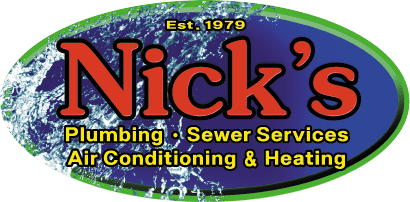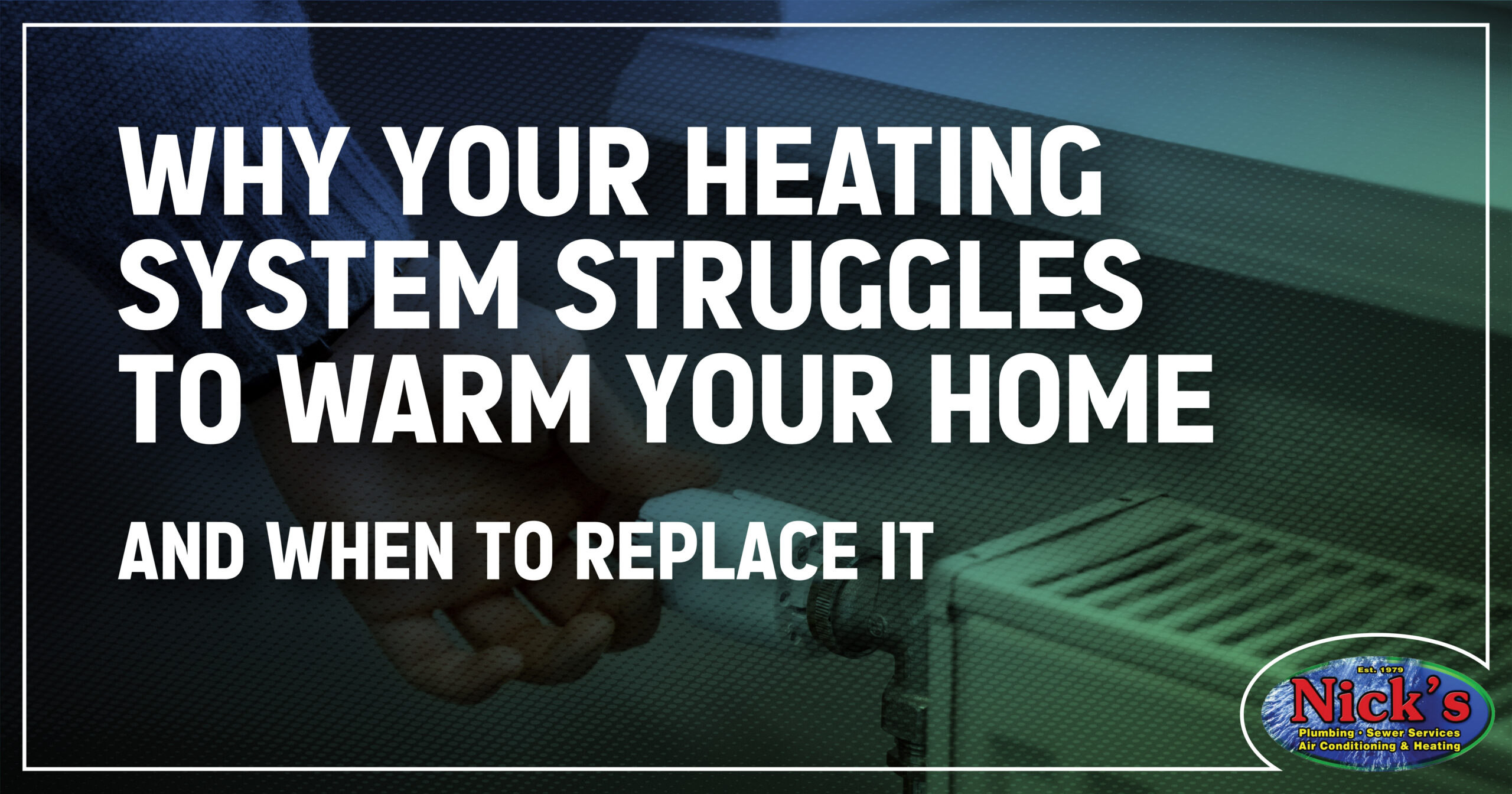Author: Jeff O'Hara
If your heating system seems to be constantly running but your home still feels chilly, it could be more than just that cold front passing through.
Several common issues could affect your system’s performance, causing a furnace to not heat properly or certain rooms to be consistently colder than others. These issues can include mechanical problems, airflow blockages, little (or no) insulation, and fundamental system inefficiency, which all translate to “higher energy bills.”
In many cases, homeowners notice that rooms farthest from the furnace are the hardest to keep warm. This could be due to ductwork issues, where warm air is escaping into the attic or behind the walls from a ripped duct, caused by an undersized HVAC system, or even inadequate insulation.
When the furnace is constantly running, but the whole house never seems to reach an even, comfortable temperature, that’s a clear sign that your aging heating system is losing the battle with efficiency and could be nearing the end of its life.
Warning Signs That Your Furnace or HVAC System Is Losing Efficiency.
Uneven Temperatures Around the House
If some rooms feel warm while others stay cool, your system may struggle to distribute heat evenly. This could be due to worn-out blower components, ductwork issues, or a system simply falling victim to age.
Over time, even minor performance drops can lead to noticeable comfort gaps from room to room.
It’s Running Longer Than It Used To
If your heater stays on for longer stretches to maintain the temperature, it could be a sign that it’s losing efficiency. As internal components age—like the heat exchanger or blower motor—the system has to work harder to do the same job, which can drive up your energy bills and accelerate the unit’s wear.
It Keeps Cycling On and Off
If your system is constantly starting and stopping, it may have trouble holding a steady temperature or reading the thermostat signals. This short cycling puts extra strain on key components and can lead to premature wear, especially if the issue goes unchecked for too long.
It’s Making Odd Sounds
Any new banging, rattling, or high-pitched noises from your furnace tell you that some component has likely worn out or worked itself loose. The high-pitched whine means that your blower motor is on its last leg. Call Nick’s Air Conditioning to set up an appointment to diagnose those heater noises and get your furnace back to keeping you cozy.
Inconsistent Airflow
If the air from your vents feels weak in some rooms or changes strength throughout the day, there could be an issue with the blower motor or problems hiding in the ductwork. Leaks, blockages, or disconnected sections can all mess with airflow and make your system work harder than it should.
Rising Energy Bills Without Maintaining Comfort
If your utility bills are climbing but your home still feels drafty or heats inconsistently, your HVAC system could be the reason.
As components wear down or lose efficiency over time, the system has to work harder—and run longer—to deliver the same level of comfort. That extra effort shows up in your monthly bills, even if nothing else in your home has changed.
The system is more than 10–15 years old
Even if it’s still running, an older unit is more likely to break down or run inefficiently. Worn parts like heat exchangers and blower motors can affect safety and performance over time.
Is Your Heating System Too Small for Your Home? How to Tell.
One issue we see quite often is a heating system that isn’t sized correctly for the home it’s trying to warm. An undersized system will run constantly and still struggle to maintain the desired temperature, driving up your utility bills and causing excessive wear and tear on the unit.
If you’ve added square footage to your home with a renovation and did not upsize your HVAC unit, or if the system was incorrectly sized during installation, your heater may be unable to keep up. You might notice certain areas heat up fine while others always stay cold—a key sign your HVAC system isn’t matched to your home’s needs.
How Clogged Filters, Blocked Vents, and Leaky Ducts Impact Heating Efficiency.
Before assuming the worst about your heating system losing efficiency, it’s worth checking a few common trouble spots. A dirty air filter can severely restrict airflow, making it more difficult for warm air to circulate through the house. Blocked intake or closed outflow vents can cause similar problems, especially in rooms that are tough to heat.
Leaky ducts are another issue. Warm air is escaping into your attic or behind your walls instead of being delivered where it’s needed. This makes your system work harder than necessary. Over time, this wastes energy and can shorten the lifespan of your heater.
Could a Faulty Thermostat Be the Reason Your Home Feels Cold?
Sometimes, the problem isn’t with your heater at all—it might be your thermostat. If it’s misreading the room temperature or isn’t correctly calibrated, your system may shut off before the house warms up or continue running until it is well past the set temperature.
In other instances, wiring issues or dead batteries will interfere with the thermostat’s communication with the furnace. Check your thermostat settings and ensure the unit is working correctly by running a few test cycles using the furnace and the air conditioner, just not at the same time, obviously.
Why Older Heating Systems Struggle to Maintain Consistent Temperatures.
Older heating systems have a few built-in challenges. As parts wear out, efficiency drops, and the system has to work harder to keep up. However, as with the thermostat discussed above, the problem isn’t always with the HVAC equipment.
In older homes, insulation—or the lack of it—plays a huge role in a furnace not heating properly. Historic homes in areas like the Heights and Montrose, built over 100 years ago, were often constructed without insulation in the walls or attic.
Now, unless you’ve added insulation after you moved in, your furnace is likely fighting a losing battle. Warm air is escaping as fast as it’s produced without a proper barrier to keep the heat inside, leading to uneven heating and an overworked system.
Should You Repair or Replace Your Heating System? How to Decide.
Every homeowner will eventually wrestle with this question. Let’s say your heating system is over 15 years old, has trouble keeping up with demand, requires frequent repairs, creates rising energy bills, and exhibits inconsistent performance. If that sounds like your heating system, those are all giant red flags that your furnace may need to be replaced.
Not every heating system issue is a crisis; a professional repair may be all it takes to get things back on track. The key is knowing when you’re throwing money at a system that’s simply past its prime, and the licensed and experienced HVAC technicians at Nick’s Air Conditioning can help you weigh your options and make the call.
How an Energy-Efficient Heating System Can Improve Home Comfort.
Switching to a newer, energy-efficient heating system can improve the comfort of your home and might help lower your energy bills, too. Modern units are built to hold steady temperatures more easily without working as hard.
Moreover, many high-efficiency systems now come with smart features, letting you use apps on your phone or tablet to control the heat in different parts of your home. That means you can keep the living room cozy without wasting energy heating a guest room no one’s using. If you’re on the fence about when to upgrade your heating unit, the benefits of improved comfort and lower utility bills might tip the scales.
When It’s Time to Call a Professional for Heating System Inspection or Replacement.
If you’ve done all the troubleshooting you can and things still aren’t right, it’s time to bring in the professionals. Nick’s trained and qualified HVAC technicians can take a closer look, pinpoint the problem, and give you clear guidance on what to do next.
Nick’s Air Conditioning offers full-service inspections, maintenance, repairs, and heating system replacement when necessary. Don’t wait until the cold weather hits to find out your furnace can’t keep up.
Final Thoughts – Choosing the Best Heating System for a Warm and Comfortable Home.
It shouldn’t be a struggle to keep your home warm. If your heating system is constantly running but your house still feels chilly or uneven, that’s a sign that something’s wrong. Maybe it’s taking longer than it used to, or certain rooms never seem to warm up—either way, it’s worth paying attention.
Whether it’s time for maintenance, a repair, or a complete heating system replacement, taking action now can save you a lot of stress and money in the future.
Call Nick’s Today. We’re on the Way!


